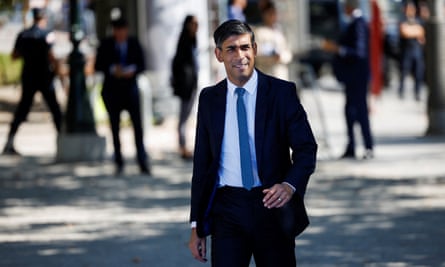British Prime Minister Rishi Sunak plans to restrict the installation of solar panels on large swaths of British farmland, which climate activists say will increase costs and put Britain's energy security at risk.
Last year, then prime minister Liz Truss tried to stop most of the country's farmland going solar. But those plans were controversial and unpopular, and were abandoned after she left office.

However, it is true that many rural Conservative MPs do not like solar panels in the countryside, and the Observer can reveal that Sunak and Environment Secretary Theresa Coffey have revived plans to impose new restrictions on this cheap renewable energy.
It is the latest watering down of green policies ahead of the general election, which began when the Conservatives won the Uxbridge by-election, a result widely attributed to anger over Labour mayor Sadiq Khan's ultra-low emissions zone.
Mr Sunak recently announced that the 2030 phase-out of new petrol and diesel cars would be delayed until 2035 and weakened the 2035 phase-out of gas boilers, confirming that it would apply to far fewer households. The government also plans to lift pollution rules for home builders in sensitive areas, who currently cannot increase sewage pollution without paying to improve nearby wetlands.
It has also been criticised for its record on renewable energy, with its stance on onshore wind described by the industry as an effective block, while the recent government renewable energy auction failed to sign off on any offshore wind.
Campaigners said Mr Sunak would further water down green policy by giving planning officers new powers in the National Planning Policy Framework (NPPF) . These will enable officials to block any solar project that could "endanger food security" — that is, anywhere food is grown. Ministers
are understood to believe that food security should be as important as energy security, and will use food shortages caused by the recent climate breakdown in Europe and the war in Ukraine as justification for the change.

Rishi Sunak has revived plans to impose new restrictions on solar panels.
The NPPF framework amendment was drafted by Buckinghamshire MP Greg Smith, who has long opposed the installation of solar panels on farmland. "This is a clear, direct protection that planning authorities up and down the land can use to say that development on this farmland will not affect our food security in the area, or that this project here will not affect our food security, and therefore it can be used as a good reason to reject the application," he said.
Coffey confirmed that the NPPF would be launched later this year and that "the primary purpose of [farmland] must be food production".
Energy experts have strongly criticized the plans. Lydia Collas, senior policy analyst at the Green Alliance, said: Solar energy will help wean us off polluting fossil fuels and protect UK agriculture from climate breakdown in the long term. It is very short-sighted to restrict terrestrial solar power generation. Alethea Warrington, senior campaigner at
climate charity Possible, added: It is shocking that as the UK faces another winter of unaffordable energy costs due to its reliance on dirty gas, "The government will make it harder to build clean, cheap energy." We urgently need.
"The idea that solar energy could interfere with Britain's food security is completely divorced from reality.". Solar power generated more than 8% of our electricity this spring, but took up less land than a golf course. This is part of the government's terrible energy policy, which includes failing to properly unblock onshore wind, failing to get any new offshore wind, and trying to push ahead with extremely dangerous new oil drilling. A spokesman for the Department of
Housing and Community Upgrading said the NPPF consultation was aimed at prioritising food production but no decision had been taken on the wording. "We have received thousands of responses to the consultation and are considering them before responding."































 浙公网安备33010802003254号
浙公网安备33010802003254号